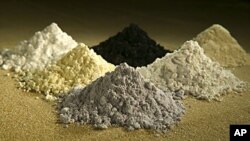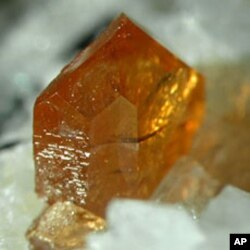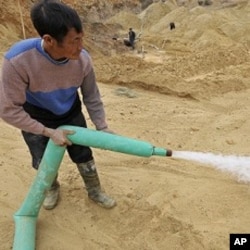The United States, the European Union and Japan are accusing China of unfairly limiting its exports of so-called "rare earth" minerals that are key components of many high-technology products.
It is a contention that Beijing rejects.
The U.S., Japan and the 27-nation EU filed a complaint against China on Tuesday with the World Trade Organization in Geneva to seek a resolution of the dispute. They alleged that China, which controls 95 percent of the world's supply of rare earth metals, has imposed export restrictions that violate world trade rules.
U.S. President Barack Obama said that is an unfair restriction of trade, and he is warning China to stop. “And as they ramp up their efforts, our competitors should be on notice: You will not get away with skirting the rules,” said Obama.
|
Five rare earths and their uses |
|
The president said he is pursuing the trade complaint so American companies can compete fairly against foreign businesses in the production of goods that require the use of the rare earths. He accused China of violating trade rules by limiting export of the minerals.
“Now, if China would simply let the market work on its own, we would have no objections," the president said. "But their policies currently are preventing that from happening, and they go against the very rules that China agreed to follow.”
The rare earth minerals are essential to the production of such common consumer items as flat-screen televisions, smartphones and hybrid cars, as well as advanced weaponry, small motors that raise and lower car windows, and wind turbines.
China says it adheres to WTO rules in exporting the minerals. But U.S. Trade Representative Ron Kirk said that China has reduced its export of the minerals in recent years, giving Chinese companies an unfair advantage in the production of high-technology products. He said China's export restraints result in massive distortions and harmful disruptions in the supply of the rare earths throughout the world.
China says it has restricted the exports in recent years in order to meet its own domestic manufacturing needs, and to ease the environmental impact from excessive mining.
But Patrick Chovanec, a professor at Beijing’s Tsinghua University School of Economics and Management, said the WTO has already ruled against China in a similar case.
“The WTO ruled, in a ruling last year, regarding other raw materials, not rare earths but other similar raw materials, that if China wanted to conserve natural resources, or it wanted to protect the environment, that export constraints were not a legitimate way of doing so," said Chovanec.
Washington says the restrictions give Chinese companies an unfair advantage by increasing production costs for foreign firms, and Chovanec suggests Beijing is trying to force high-tech manufacturers to relocate their operations to China.
Chovanec said the Chinese restrictions have prompted other countries to begin scrambling for new sources of the materials.
"The reason why China has a monopoly isn't because it has a stranglehold on the supply, it's just that it’s the lowest-cost producer and everyone else got out of the business," Chovanec added. "There are Australian companies, American companies, Japanese companies are looking around in Central Asia and other places and even on the ocean floor for these materials."
The complaint over rare earths is the latest action taken by the Obama administration against Beijing over what it claims to be unfair trading practices. The administration imposed a series of tariffs on Chinese tires in September 2009, claiming that surging imports of Chinese tires were hurting U.S. tire manufacturers and threatening jobs.
Mr. Obama has also announced the creation of a new trade enforcement center to ensure that China and other nations abide by WTO rules.
Our White House Correspondent Kent Klein contributed to this report.
Some information for this report was provided by AP, AFP and Reuters.






